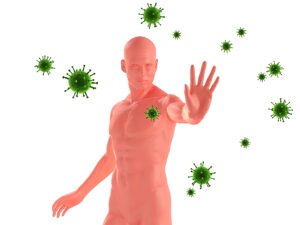The Archives of Physiology and Biochemistry published a review explaining how nutrients strengthen the immune system against viruses. The researchers reviewed 51 articles, many of them randomized clinical trials and meta analyses. Notably, the following results identified what the immune system needs for optimal function.
- Protein as a source of amino acids
- Omega-3 fatty acids
- A vitamin
- Vitamin B1, B6 and B12
- C vitamin
- D vitamin
- Vitamin E
- Iron
- Selenium
- Zinc
Why the supplements work
To emphasize, the mechanism behind these necessary supplements were as follows.
1.For instance, the immune system requires amino acids for antiviral actions. Protein is digested into amino acids.
2. Omega-3 fatty acids are essential for body and help to modulate the immune system.
3. Vitamin A helps to maintain mucosal integrity.
4. Vitamin B1 stimulates the innate immune system.
5. Vitamin B6: This vitamin is important for antibody production by B cells. Vitamin B6 regulates the metabolism of amino acids, which in turn form proteins. Antibodies and cytokines require vitamin B6. The T helper immune cells that initiate an adaptive immune response depend on vitamin B6 as well.
Vitamin B12 and vitamin C
6. Vitamin B12: Methylation pathways depend on vitamin B12 as a coenzyme. Vitamin B12 is also a coenzyme in the production of energy from fats and proteins. In addition, hemoglobin synthesis depends on vitamin B12. Patients with vitamin B12 deficiency develop pernicious anemia. These patients also have a weak immune system due to natural killer cell activity suppression and because circulating lymphocyte numbers are significantly decreased.
7. Vitamin C has anti-inflammatory effects in sepsis. This vitamin is a powerful antioxidant. It can neutralize reactive oxygen species, which are produced when the immune cells fight viruses and bacteria. Neutrophils, lymphocytes and phagocytes are all supported by vitamin C. Vitamin C and E co-operate in their antioxidant functions.
Vitamin D and E
8. Vitamin D: The immune system is very dependent on vitamin D as the immune cells all contain vitamin D receptors. People who have less than 10 ng/mL of vitamin D in the blood are vitamin D deficient. They have much higher death rates when they get infected with the Covid-19 coronavirus. Vitamin D regulates the expression of target genes. At the center is the vitamin D receptor, which is a nuclear transcription factor. You need enough vitamin D for your immune system. When enough vitamin D is present in the blood (more than 30 ng/mL) the immune system releases the peptides cathelicidins and defensins, which effectively destroy bacteria and viruses.
Antioxidant vitamin E
9. Vitamin E: This is a vitamin that is fat soluble and helps the body to maintain its cell membranes. But researchers found that vitamin E also stimulates the T cell-mediated immune response. This is particularly important for the aging person to prevent respiratory tract infections. The most potent form of vitamin E are tocotrienols.
Minerals
10. Iron: Iron is important for cell oxygen transport and storage, DNA synthesis and for mounting an effective immune response. In particular it is the T cell differentiation and proliferation where iron is necessary. Iron deficient people get a lot of infections because the immune system is paralyzed.
11. Selenium: This is a trace mineral that is important for a normal immune response and for cancer prevention. When selenium is missing, both the adaptive and innate immune system are suffering. In this case viruses are more virulent. With selenium supplementation cell-mediated immunity is improved and the immune response to viruses is more potent
12. Zinc: Zinc is important for a normal function of the innate and adaptive immune system. As zinc cannot be stored in the body, taking regular zinc supplements (30 to 50 mg daily) is important.
Other factors not listed here are described in this blog.
Conclusion
The immune system depends on a variety of factors to keep it strong. I listed 12 factors that a review article in The Archives of Physiology and Biochemistry in 2020 mentioned. But other researchers found that the immune system requires additional factors. Folic acid, copper and magnesium are some of those additional factors, as well as probiotics that help to normalize the bowel flora and reduce inflammation in the body. The literature showed that the researchers reviewed 51 articles, many of them randomized clinical trials and meta analyses. Another observation comes from clinical courses of Covid-19. Those who took most of the listed supplements had a mild course of the disease and did not end up in the ICU, because the immune system was strong enough to fight it.
Other helpful items to fight Covid-19
The key is to eat balanced meals and take supplements to non-specifically strengthen the immune system. In addition, it is important to use one of the anti-Covid-19 vaccinations to specifically prime the immune system against Covid-19.







